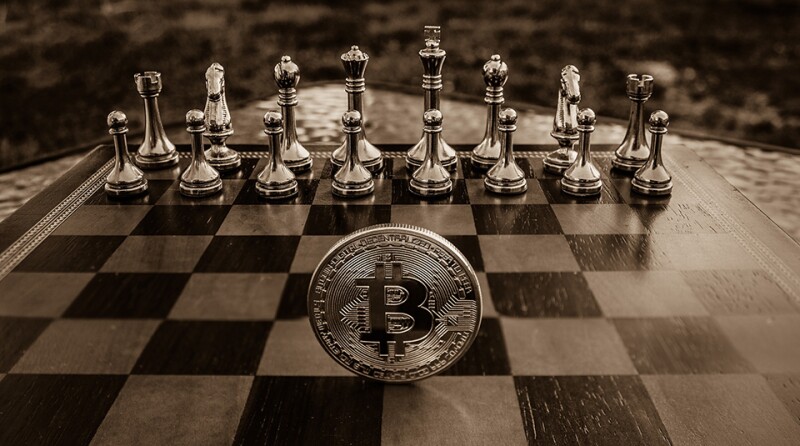
On Wednesday, as Russian rockets hit Ukrainian cities and Western sanctions froze hard the currency reserves of the Central Bank of Russia held outside the country, bitcoin hit $44,330. Just one week earlier, on February 23, the day before Russia invaded Ukraine, one bitcoin would have bought you only $37,000.
A rise of almost 20% is nothing out of the ordinary in cryptocurrencies.
Bitcoin has always been volatile, but in recent months it has lost some of that, instead tracking conventional financial markets. The best days of the leading crypto were during the extraordinary accommodation of the pandemic when governments spent freely, central banks bought their bonds and took real interest rates deep into negative territory.
From $5,165 on March 12, 2020, bitcoin rose to $61,230 a year later. Then, at the end of 2021, it crashed, just as world central banks realised how far behind the curve on inflation they had fallen and began talking up the coming pivot to higher rates and quantitative tightening.
From $64,400 on November 12, 2021, bitcoin fell 46% to $35,000 on January 21, 2021.
Maybe bitcoin is an inflation hedge after all.
Use case
Does the latest upturn relate to fears that central banks will be happy once more to debase their currencies to fight a recession arising from war in Europe and let inflation run hot?
Or is something else happening? Are Russians buying cryptocurrency to dodge the sanctions that threaten to cut the country’s largest banks off from Swift and make international transfers so much more expensive and cumbersome?
Russians buying crypto actually represents a use case of the sort for which crypto was intended

Whether they are or not, George Monaghan, thematic analyst at GlobalData, offers this view: “Russians buying crypto actually represents a use case of the sort for which crypto was intended. Crypto, being decentralized, is less vulnerable to government regulations than fiat currencies.”
While Swift awaits notification of which Russian banks to disconnect, Mastercard and Visa have frozen their operations in Russia. But Russians can still make crypto transactions. Crypto exchanges have explained their reluctance to freeze the wallets of all Russians – as far as their pseudonymous owners can be identified as Russian – because that punishes ordinary citizens that have nothing to do with an invasion some of them oppose.
US and other Western sanctions aim to freeze the accounts of specific named individuals with links to the Putin regime, including family members.
For its part, the Russian government has refused to open the Moscow stock exchange. But Russians can still trade crypto assets.
Monaghan says: “This activity reminds us what crypto was really meant to be, before the hype and the meme-coins and the gains: decentralized and unregulated. No, the Russian government won’t be able to move all its operations into crypto and continue as normal. But citizens may be able to preserve some of their money.”
Private pain
The supposedly draconian action of turning off Swift may have little impact on Russian oligarchs and politically exposed persons, most being already well versed in the use of shell companies and fake identities to avoid sanctions. But it could cause great pain for innocent private citizens and small businesses.
Presumably Western governments want to impose that pain to nudge regime change. If so, that’s a ruthless ploy – albeit less so than shelling and killing innocent civilians in Ukraine. And it is one that may backfire and harden support for the Russian leader.

ThetaRay provides AI-powered transaction monitoring software that tracks global cross-border payments by analyzing Swift traffic, risk indicators and client data to detect suspicious activities across complex, cross-border transaction paths – including the use of shell people and companies. It also screens transactions for financial activity by individuals who have been placed on sanctions lists.
“ThetaRay’s technology enables unhindered flow of global payments by organizations and peoples while preventing money transfers by sanctioned totalitarian regimes and criminals,” says Erel Margalit, chairman of ThetaRay. “Instead of blocking entire countries and economies, it can block only illegitimate sources. This system can fortify Swift because it can safeguard transfer of funds to legitimate people.”
He adds: “The ThetaRay system is the answer for Nato countries and the West to enforce sanctions on Russia.”
Reliability
Meanwhile, in Russia at least, cryptocurrencies may no longer be a speculative investment.
Monaghan says: “To be clear, Russians aren’t buying crypto because it looks promising – it’s due to it appearing more stable than the rouble.”
Longer term, businesses that work with Russia will need to ensure they can get paid, especially if Swift is turned off

The Russian currency fell 38% against the dollar within one week of the invasion. That’s crypto-style volatility circa 2017.
Matthew Le Merle, managing partner of Blockchain Coinvestors, a leading blockchain venture fund of funds, says that while Russian and Ukrainian citizens need to find a reliable store of value right now and it appears that bitcoin is an option outside the oversight of their respective governments, corporations may also look to crypto.
He says: “Longer term, businesses that work with Russia will need to ensure they can get paid, especially if Swift is turned off. This includes all sorts of businesses in countries that are not overseen by the EU and US but which still rely upon Swift. Likely, bitcoin is an option.”
If crypto enables Putin’s people to bypass sanctions, that will not endear it to Western politicians, regulators or investors. And nor is that quite the David versus Goliath use case crypto advocates themselves tend to raise.
But for all that, Russia’s war in Ukraine could even encourage mass adoption.
“Better to store your wealth in a cryptographically secure wallet than transfer it into cash or jewellery and walk across the countryside where you might be attacked,” one source tells Euromoney.
It’s a horrible thought, but these are horrible times.
